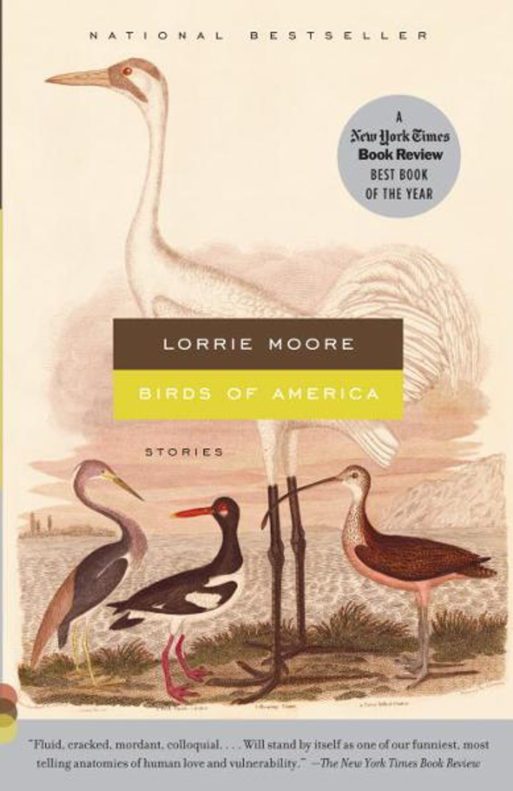 Lorrie Moore has made an appearance on this blog before for a reason. Her simple, incisive writing and her tragically everyday characters make for some very affecting pieces on life, death and sickness. Moore’s 1998 collection of short stories is no different. Named Birds of America because every story, however tangentially, contains some reference to a bird, the collection is strong (and much like her earlier collection Self-Help ) consistently moving. Two stories in particular stand out, with both having to do with the mortality of young children.
Lorrie Moore has made an appearance on this blog before for a reason. Her simple, incisive writing and her tragically everyday characters make for some very affecting pieces on life, death and sickness. Moore’s 1998 collection of short stories is no different. Named Birds of America because every story, however tangentially, contains some reference to a bird, the collection is strong (and much like her earlier collection Self-Help ) consistently moving. Two stories in particular stand out, with both having to do with the mortality of young children.
“People Like That Are the Only People Here: Canonical Babbling in Peed Onk” is a forty-page opus about a Mother (no name is given) and the ordeal of seeing her child, the Baby, through pediatric oncology. The story begins when she finds a blood clot in his diaper.
The Mother takes him to a hospital, where she is perturbed by the somewhat cavalier attitude of the doctors. “Cute kid,” the Radiologist says after the examination is done, ruffling the Baby’s hair as he walks out. The Surgeon tells her the Baby must get chemo.
The Mother is not a shopper. She hates to shop, is generally bad at it, though she does like a good sale. She cannot stroll meaningfully through anger, denial, grief, and acceptance. She goes straight to bargaining and stays there. How much? she calls out to the ceiling, to some makeshift construction of holiness she has desperately, though not uncreatively, assembled in her mind and prayed to; a doubter, never before given to prayer, she must now reap what she has not sown; she must assemble from scratch an entire altar of worship and begging (220).
— Lorrie Moore, Birds of America
The long, strange title is derived from the Mother’s observation of the other parents in the pediatric oncology unit: worried, bedraggled mothers in sweatpants; zombie fathers, some of who have been doing the hospital rounds for years. It’s a tragic, harshly lit, perpetually grief-ridden place. The Mother is horrified, but she has also become a part of it.
The story ends on a fairly unresolved note. However, the following story in the collection begins with the death of a child, which — reading it as I did standing up, waiting for the bus — hit me in the stomach. In the story, “Terrific Mother,” the character of Adrienne is an unwitting participant in her friend’s baby’s death when the bench she is sitting on, whilst holding the baby, collapses.
For the rest of the story, Adrienne attempts to deal with this tragedy — she begins by spending several months never leaving her apartment — and simultaneously with her own childlessness.
He was a beautiful child, didn’t you think? In bed, Martin held her until he rolled away, clasped her hand and fell asleep. At least there was that: a husband sleeping next to a wife, a nice husband sleeping close. It meant something to her… She lay awake and remembered when her father had at last grown so senile and ill that her mother could no longer sleep in the same bed with him—the mess, the smell—and had had to move him, diapered and rank, to the guest room next door. Her mother had cried, to say this farewell to a husband. To at last lose him like this, banished and set aside like a dead man, never to sleep with him again; she had wept like a baby. His actual death, she took less hard. At his funeral, she was grim and dry and invited everyone over for a quiet, elegant tea (265).
— Lorrie Moore, Birds of America
In this way, both of the female protagonists deal with the loss — potential or actual — of a child. They cope with loss through the lens of motherhood, with both growing terrified of what their lives might be like without a child.
Related Articles:
- The five stages of grief in Lorrie Moore’s “People Like That Are the Only People Here”
- The New York Times review of Lorrie Moore’s A Gate at the Stairs
- Publisher’s Weekly: Lorrie Moore: Flipping Death the Bird

 “Birds of America” by Lorrie Moore (1998)
“Birds of America” by Lorrie Moore (1998)



 “Help Me, Helen”
“Help Me, Helen”
 Recovering Cremation Remains After the Los Angeles Fires
Recovering Cremation Remains After the Los Angeles Fires
 “As Tears Go By” by Marianne Faithfull
“As Tears Go By” by Marianne Faithfull














